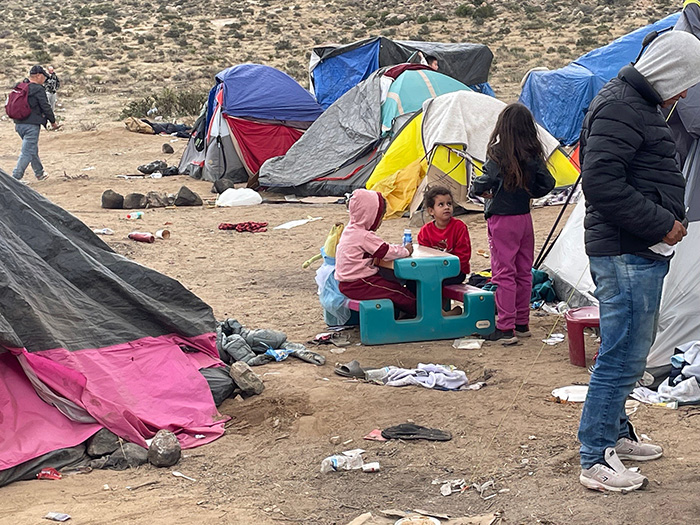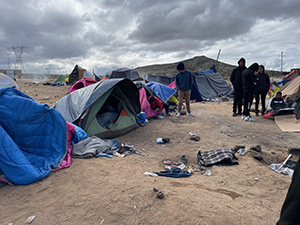 When there is no space in government detention centers, children must wait in open air camps on the U.S. side of the border, such as this one in Jacumba. Some children have been left to wait for days. Photo courtesy: Janine Young/UC San Diego Health Sciences
When there is no space in government detention centers, children must wait in open air camps on the U.S. side of the border, such as this one in Jacumba. Some children have been left to wait for days. Photo courtesy: Janine Young/UC San Diego Health Sciences
Unaccompanied immigrant children continue to arrive at the U.S.–Mexico border and are at high risk for ongoing abuse, neglect, and poor mental and physical health. To address this problem, Janine Young, M.D., professor in the Department of Pediatrics at UC San Diego School of Medicine, has collaborated with human rights organizations and other academic institutions to develop a detailed list of recommendations for the federal government to improve the health and safety of unaccompanied immigrant children.
The new recommendations are included in an essay in the American Journal of Public Health. Co-authored by Young, the essay provides an overview of the US federal agencies with custody of unaccompanied immigrant children, a summary of medical care provided while in custody, and recent findings from an independent Juvenile Care Monitor Report mandating new custodial conditions for immigrant children while in federal custody.
“We’ve all seen the disturbing images of children in custody at detention centers, but many people don’t appreciate the full scope of the challenges faced by children who arrive in this country without a guardian,” said Young. “Lack of access to adequate medical evaluation and care not only puts children at risk while in custody, it also makes it much more difficult for them to thrive once they’re released into the care of a sponsor.”

Current medical protocols for immigrant children in custody are inconsistently applied and frequently fail to diagnose and treat both physical and mental health conditions. Further, screening for many diseases affecting immigrant children, such as sexually transmitted infections, blood-borne pathogens, and acute mental illness, requires children to have disclosed sensitive information, such as sexual activity, abuse, or drug use.
Once released from custody to the care of a parent or other sponsor, immigrant children face significant barriers to accessing ongoing health and mental health care. Most undocumented children are released to states without Medicaid coverage for undocumented immigrants. Further, undocumented sponsors may avoid seeking care for themselves or the child for fear of deportation. Combined, these and other factors put undocumented immigrant children at significant risk for ongoing physical and mental health issues, both while in custody and upon release.
To address these concerns, Young other experts in the field of immigrant and refugee health, child abuse, and the legal rights of international refugee and migrant children, developed a list of recommendations for the federal government. These recommendations include strategies to better diagnose common health conditions and improve access to appropriate care for children in custody, guidelines for how to better support immigrant children upon release to U.S. sponsors and funding recommendations to support these systemic changes.
"The recommendations we outline will be challenging to implement given the polarizing conversations around immigration in the United States, but it’s not an issue that’s going away any time soon, as more and more unaccompanied children show up at the border every day,” said Young. “It’s only by supporting and caring for these vulnerable children that we can maximize their likelihood of reaching their full potential and having a positive impact on society.”
— Miles Martin